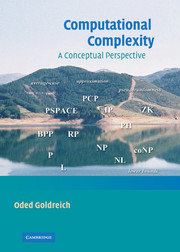Book contents
- Frontmatter
- Contents
- List of Figures
- Preface
- Organization and Chapter Summaries
- Acknowledgments
- 1 Introduction and Preliminaries
- 2 P, NP, and NP-Completeness
- 3 Variations on P and NP
- 4 More Resources, More Power?
- 5 Space Complexity
- 6 Randomness and Counting
- 7 The Bright Side of Hardness
- 8 Pseudorandom Generators
- 9 Probabilistic Proof Systems
- 10 Relaxing the Requirements
- Epilogue
- Appendix A Glossary of Complexity Classes
- Appendix B On the Quest for Lower Bounds
- Appendix C On the Foundations of Modern Cryptography
- Appendix D Probabilistic Preliminaries and Advanced Topics in Randomization
- Appendix E Explicit Constructions
- Appendix F Some Omitted Proofs
- Appendix G Some Computational Problems
- Bibliography
- Index
9 - Probabilistic Proof Systems
Published online by Cambridge University Press: 05 June 2012
- Frontmatter
- Contents
- List of Figures
- Preface
- Organization and Chapter Summaries
- Acknowledgments
- 1 Introduction and Preliminaries
- 2 P, NP, and NP-Completeness
- 3 Variations on P and NP
- 4 More Resources, More Power?
- 5 Space Complexity
- 6 Randomness and Counting
- 7 The Bright Side of Hardness
- 8 Pseudorandom Generators
- 9 Probabilistic Proof Systems
- 10 Relaxing the Requirements
- Epilogue
- Appendix A Glossary of Complexity Classes
- Appendix B On the Quest for Lower Bounds
- Appendix C On the Foundations of Modern Cryptography
- Appendix D Probabilistic Preliminaries and Advanced Topics in Randomization
- Appendix E Explicit Constructions
- Appendix F Some Omitted Proofs
- Appendix G Some Computational Problems
- Bibliography
- Index
Summary
A proof is whatever convinces me.
Shimon Even (1935–2004)The glory attached to the creativity involved in finding proofs makes us forget that it is the less glorified process of verification that gives proofs their value. Conceptually speaking, proofs are secondary to the verification process, whereas technically speaking, proof systems are defined in terms of their verification procedures.
The notion of a verification procedure presumes the notion of computation and furthermore the notion of efficient computation. This implicit stipulation is made explicit in the definition of NP, where efficient computation is associated with deterministic polynomial-time algorithms. However, as argued next, we can gain a lot if we are willing to take a somewhat non-traditional step and allow probabilistic verification procedures.
In this chapter, we shall study three types of probabilistic proof systems, called interactive proofs, zero-knowledge proofs, and probabilistic checkable proofs. In each of these three cases, we shall present fascinating results that cannot be obtained when considering the analogous deterministic proof systems.
Summary: The association of efficient procedures with deterministic polynomial-time procedures is the basis for viewing NP-proof systems as the canonical formulation of proof systems (with efficient verification procedures). Allowing probabilistic verification procedures and, moreover, ruling by statistical evidence gives rise to various types of probabilistic proof systems. Indeed, these probabilistic proof systems carry a probability of error (which is explicitly bounded and can be reduced by successive applications of the proof system), yet they offer various advantages over the traditional (deterministic and errorless) proof systems. […]
- Type
- Chapter
- Information
- Computational ComplexityA Conceptual Perspective, pp. 349 - 415Publisher: Cambridge University PressPrint publication year: 2008



